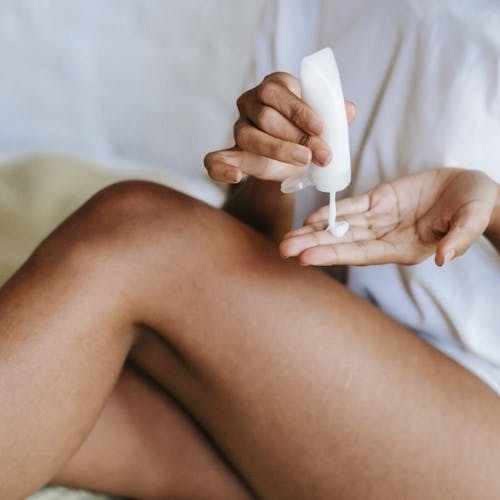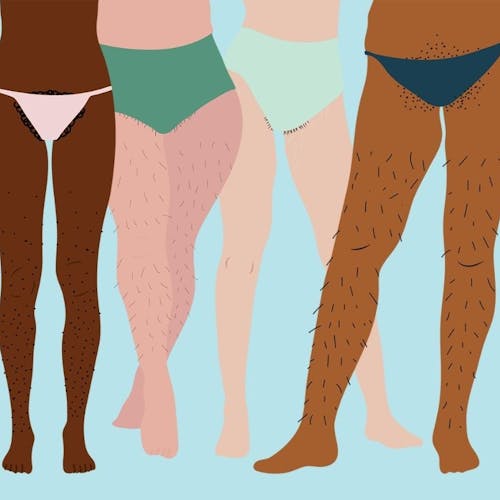This website uses cookies to enhance the user experience. By using Yoppie you are agreeing to our use of cookies.
Vaginal Itching: Common Causes Of Irritation & Discomfort
Written by Yoppie
The most common causes 🔬
STIs 🍆
Yeast infection 💥
Lichen Sclerosus 🔥
Irritants or allergic reactions 😣
At-home remedies for vaginal irritation
We’ve all had those awkward moments where an itchy downstairs has caused us to perform a quick and crafty crotch swipe in a public place… sometimes you just have to go for it! But what about when the itch doesn’t go away?
Vaginal itching, which can be a result of inflammation of the vagina, known as Vaginitis, is actually very common and can be due to a number of issues. We’re delving into the causes, solutions and at-home remedies that could help you out - let’s scratch that itch!
The most common causes 🔬
We want to make it clear that if you experience pain in or around your vagina, it is recommended that you visit your GP to discuss, as this could signal an underlying issue. What we’re talking about here is itching, irritation, burning and general discomfort in your lady bits, with the most common causes being:
- Bacterial Vaginosis
- Yeast infections Sexually transmitted infections (STIs)
- A condition called Lichen Sclerosus
- Irritation from waxing, shaving, products or allergic reactions
Let’s take a look at each one a little closer...
Bacterial Vaginosis 🦠
We’ve gone into more detail about Bacterial Vaginosis here, and how the vagina is home to a healthy balance of bacteria. When the balance is off, infections can occur that lead to symptoms like itching, inflammation, burning, and discharge. Bacterial Vaginosis (BV) is a common culprit of vaginal itching, and is often accompanied by an unusual ‘fishy’ smell to your discharge.
How to scratch the itch: Thankfully, BV is relatively simple to treat with antibiotic tablets, and your GP can prescribe the appropriate medication.
STIs 🍆
Sexually transmitted infections (known as STIs) like chlamydia, gonorrhea and others, have been known to cause vaginal itching and irritation. These infections are contracted by having sexual contact with a person who is infected.
How to scratch the itch: Each STI is treated differently, so it’s always best to visit your GP or local sexual health clinic and have them diagnose the infection and decide the best treatment. Not seeking treatment can leave long-term complications, so don’t wait to speak to someone if you suspect an STI.
Yeast infection 💥
Yeast infections, also known as thrush, are common, and around 30-50% of women develop one in their lifetime. (1) These infections occur when candida yeast, found in the vagina, grows excessively, and this can be triggered by a number of things, including a weakened immune system, sex, antibiotic use and pregnancy. One of the main symptoms? Itchiness - eek!
How to scratch the itch: Yeast infections are easily treatable with over-the-counter medication, so if the infection is not too severe, your local pharmacy can help. If this doesn’t work or your symptoms are particularly uncomfortable, see your GP for other options.
Lichen Sclerosus 🔥
Lichen… what now? This one is a tongue-twister, and luckily it’s rather rare, however it’s worth mentioning here as one of the main symptoms is intense itching. Lichen Sclerosus is a condition affecting mostly postmenopausal women, which causes white rash-like patches to form on the skin, particularly around the vulva area.
How to scratch the itch: It’s easy to panic when you see Lichen Sclerosus rashes, especially as its symptoms mimic that of vulvar cancer. For this reason, it’s important to speak to a doctor who can rule out this diagnosis and get you on a topical steroid to treat the condition. The patches can leave permanent scarring, so always seek help at the first sign of Lichen Sclerosus.
Irritants or allergic reactions 😣
Known as Contact Dermatitis, the skin’s exposure to irritating chemicals can affect your vagina in unexpected ways. Shower gels, contraceptive foams, shaving/waxing products, laundry detergents, even scented toilet paper could be to blame for that annoying itch. (2) Don’t discount allergies either, as you may have developed an allergy to things like menstrual pads, latex condoms, or even fragrances in deodorants.
How to scratch the itch: The wonders of biology have ensured that the vagina is self-cleaning! So you can leave it to do its own thing without using potential irritants. With things like laundry detergent, try to find a more skin-friendly alternative by looking for product packaging that boasts natural ingredients or pH balanced formulas. If your period products are to blame, our pads, tampons and liners are all made from hypoallergenic organic cotton, designed to ensure your vagina stays irritation-free.
At-home remedies for vaginal irritation
It’s always a good idea to discuss irritation or discomfort with your doctor, but there are a few things you can do to prevent and treat the problem at home:
- Do an audit of the products in your home that come into contact with your vagina - period products, toilet paper, bubble bath, condoms, and more. Look at the materials and ingredients, and if you suspect an irritant or allergy, hunt for a better option
- Stop use of all vaginal cleaning products… remember your vagina is self-cleaning! Use water and a plain, unscented soap to clean daily, but only the external area. The inside will take care of itself without any need for douching
- Wear cotton underwear and avoid synthetic fabrics
- Invest in a quality razor if you choose to shave the area, and give your skin regular breaks from waxing or shaving
- Use condoms during sex to prevent STIs, and remember that other forms of birth control do not protect against STIs
- Get to know your discharge - if you notice a change in colour, consistency or smell this may indicate an infection so it's time to get checked out!
Do you have the dreaded itchy vagina? We’ve all been there! Let us know what you’re doing to get rid of the problem. You’ll find us over on Instagram @itsyoppie. Don't forget that our personalised period subscription box can get your menstrual care delivered easily and regularly through your letterbox, from organic tampons to PMS supplements, and much more to help you manage your entire cycle.
Fact checked by Doctor Brooke Vandermolen.
Section jump
Back to top
Subscribe To Our Newsletter
YOPPIE





© 2026 Yoppie is a registered trademark of Phlo Technologies Ltd.
Yoppie's supplements are not a substitute for a varied diet and healthy lifestyle and are not intended to diagnose, treat, or cure any disease. If you are pregnant, breastfeeding, have a medical condition or are under medical supervision, please consult with your doctor before taking any of our products.






